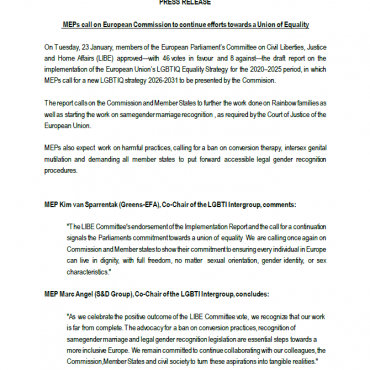Malawi presidential pardon is wise and humane, but means little if laws don’t change
The two Malawian citizens convicted of ‘gross indecency’ and ‘unnatural acts’, who had been sentenced to 14 years’ imprisonment and hard labour, were pardoned on Saturday 29 May by Malawian President Bingu wa Mutharika. Members of the European Parliament welcome this development, but call for caution.
 Steven Monjeza (26) and Tiwonge Chimbalanga (20), who identifies as a woman, were arrested in December 2009 following a symbolical same-sex wedding ceremony in public. Their arrest, 5-month detention and heavy prosecution drew widespread international condemnation, including from High Representative of the European Union Catherine Ashton (PDF).
Steven Monjeza (26) and Tiwonge Chimbalanga (20), who identifies as a woman, were arrested in December 2009 following a symbolical same-sex wedding ceremony in public. Their arrest, 5-month detention and heavy prosecution drew widespread international condemnation, including from High Representative of the European Union Catherine Ashton (PDF).
The couple has now been set free ‘on humanitarian grounds only’, as President Mutharika pardoned them whilst disapproving of their act and recalling its illegality. The pair has been warned that performing similar actions in the future would send them back to prison.
Michael Cashman MEP, Co-president of the European Parliament’s Intergroup on LGBT Rights, commended the President’s decision: “The President made an exemplary and wise use of his powers. Steven and Tiwonge have done nothing wrong but love one another, and their punishment was inappropriate. This pardon must pave the way for a more humane treatment of lesbian, gay, bisexual and transgender Malawian and African citizens. We hope Steven and Tiwonge will now be able to live their lives freely and safely.”
Ulrike Lunacek MEP, Co-president of the Intergroup on LGBT Rights, further commented: “A presidential pardon is one thing, which I warmly welcome in this case, but Malawi must now consider what its legal system stands for: upholding equality as enshrined in the Malawian Constitution, or unfairly jailing innocent citizens for crimes that harmed no-one? Homosexuality and transgenderism have never been ‘un‑African’, and African and Christian values are based on love and tolerance. Malawi should now honour its national and international obligations by decriminalising homosexuality.”
The Intergroup will continue monitoring the situation for LGBT people in Malawi and Africa, calling for the European Union to act in accordance with its core values in diplomatic representations.






